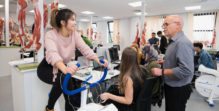University of Central Lancashire
The University of Central Lancashire (UCLan) Medical School, opened in 2015 and primarily takes international students.
UCLan is currently ranked 37th in the UK for medicine by the Guardian 2024 and 33rd in the UK by the Complete University Guide.
About The Course
The University of Central Lancashire’s Medicine & Surgery MBBS develops professional, compassionate doctors through their innovative course delivery including early patient contact and teaching in state-of-the-art facilities.
UCLan’s unique intake of mostly international students provides a rich and multicultural environment.
The MBBS programme is accredited by the General Medical Council (GMC) and listed in The World Directory of Medical Schools.
UCLan provides medical training to the highest UK standards with a modern, spiral curriculum designed to build on your knowledge gradually. The MBBS programme places considerable emphasis on developing your expertise in a whole range of practical areas, including clinical, communication, observation, teamwork and leadership skills.
Structure Of The Course
Year 1-2
The first two years are primarily based in UCLans Preston campus whereas the latter years are based at campuses either in Burnley or Westlake. Placements at UCLan are at seven partnered trusts and a variety of GPs based in the North West of England.
You will primarily study:
Integrated Science and Clinical Medicine/Practice: The scientific underpinnings of medicine including biology and disease. In later years this theme focuses on integrating patient care and science through study in the clinical setting
Year 3-4
Your studies will be centered around the following modules:
- Evidence Informed Practice of Medicine: The factor of health and wellbeing at the community and population levels, including the studies of sociology, epidemiology and public health.
- Medical Skills and Quality Care: The development of clinical and communication skills needed to be a medical doctor.
Year 5
In Year 5, you will study Transition to Clinical Practice, which will focus on your knowledge and skills to support a smooth transition from undergraduate to postgraduate pre-registration practice.
Academic Requirements
GCSEs: Evidence of sustained academic achievement with a broad study of Science English and Maths up to 16.
A-levels: AAA At least two science subjects, including Chemistry.
International Baccalaureate: 36 points Chemistry and another science subject at Higher Level H6, plus one other at H6.
IELTs (International applicants only): Minimum of 7.0 in all components.
Bachelor's Degree (Graduates only): Minimum of 2:1 in a science or health subject.
Mitigating Circumstances
Resits policy: A-level resits are not accepted.
Extenuating circumstances: Any extenuating circumstances should be mentioned in both your personal statement and academic reference. UCLan will then consider these on a case by case basis.
Deferred entry: Students wishing to defer their entry into medicine are considered by UCLan.
Transfers: UCLan considers transfers into medicine from other medical related courses at UCLan.
Further Entry Requirements
Work experience: Applicants who have taken paid employment may discuss examples from their interactions with people at work. Active involvement in helping underprivileged, unwell, disabled or distressed people is valuable in gaining experience for a future career in caring.
Personal statement: Unlike other UK medical schools, UCLan does look at applicants’ personal statements. Students are advised to cover the following in their statement:
1. Reasons for applying to study medicine
2. The role of a doctor
3. Your health related or care work experience
4. Work-life balance
5. Initiative and enterprise
6. Teamwork and communication
7. Quality of writing
Admissions Process
Applications for UCLan Medical School can be made either via UCAS or directly through their application portal. The deadline for UCAS applications is usually mid October and although there is no deadline for the direct application portal, students should apply as early as possible to ensure it can be processed in time. Both applications will include details regarding your academic history as well as your personal statement and other qualifications/achievements.
Admissions Tests:
UCAT ✅
UK candidates only are required to sit the University Clinical Aptitude Test (UCAT) as of the 2024 entry admission cycle. You can learn more about the UCAT in our guide. It is unclear however how UCLan uses applicants UCAT scores in their application process.
UCLan scores candidates personal statements and academic references in order to determine which applicants will be offered an interview.
As UCLan only recently started implementing the UCAT, there are no statistics for prior admissions.
Interview Type: MMI
Interview Topics: Interviews at UCLan are in the Multiple Mini Interview (MMI) style which take place from December to April, either online or in person. There are typically six to ten stations and although no details are provided, it is likely that the qualities assessed in your personal statement and reference will be similar to what are being looked for in the interview. You can find out more about interviews at UCLan on our school-by-school guide.
Applicants successful with their interview may expect an offer from three weeks after their interview, however, this may vary.
Admissions Statistics
| Total number of applicants: | 300 |
| Total number of places: | 50 |
| Total number of entrants: | 50 |
| Acceptance rate: | 16.67% |
Fees
| Home students: | £9250 pa |
| Rest of UK: | TBC |
| International students: | £49999 pa |
Teaching Methods
Teaching style: UCLan Medical School employs a spiral curriculum in which teaching each year builds upon the knowledge learnt from previous years. They aim to split their teaching with 80% face-to-face and 20% online.
Students studying medicine at UCLan have the benefit of learning using state-of-the-art facilities including on-campus clinical skills laboratories and clinical human simulators.
Intercalation mode: Its MRes Medical Sciences is designed to enable intercalating medical students, clinicians and graduates to pursue a research career in key areas of medicine and bioscience in academia, healthcare settings or industry
Graduate Prospects
75% of graduates from UCLan Medical School were in full time employment or further study 15 months after graduating, with average annual earnings being £34,000.
Additionally, 95% of graduates feel they are using what they learnt in their studies in their current work.
FAQs
Does UCLan medical school use the UCAT?
UCLan requires UK students to sit the UCAT as of 2024. Your UCAT score will be used as part of the selection process prior to interview. International students are not required to sit any admissions test.
What is the acceptance rate for UCLan Medicine?
UCLan has not released its admissions statistics and no verified information regarding acceptance rates can be found.
Is UCLan a Russell Group university?
Yes, UCLan is a member of the 24 research-led Russell Group Universities
Does UCLan take international students?
Yes, in fact the vast majority of places at UCLan Medical School are reserved for international students, with only a small number of places for UK students who must be from the North West of England.


